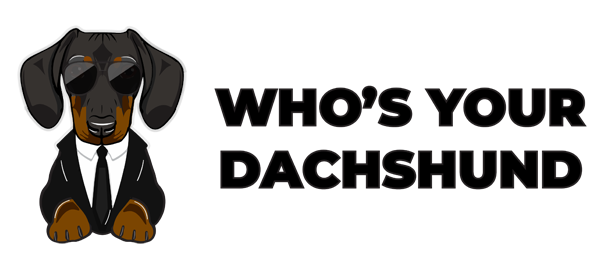
Dachshunds have many different sounds that they can make. Here are some of the most popular and what they mean:
- A loud bark means the Dachshund is excited or scared.
- A ‘talking’ noise means the Dachshund wants attention from its owner or for you to pet the dog.
- Hissing possums means the Dachshund is angry. Your dog will hiss with all four feet planted firmly on the ground, its tail sticking straight out. It is best to leave your dog alone when it does this. If you try to pet your dog, it can bite! When a Dachshund does this, he will growl and snarl at whatever has angered him. You might hear sounds of feet running and see your Dachshund stalking another animal or person (or inanimate object).
- A ‘snuffling’ noise means the Dachshund is anxious or scared.
- The sound of breathing is usually a sign of stress or pain.
- Groaning means the Dachshund is very happy and excited and may sit up on its hind legs.
- Short sharp yelp, growl, bark, or snarls mean that your dog is protective over something – much like a family member or another pet. If someone approaches your young child, your dog will make this noise.
- A long low, hissing noise can be made by a dog who has been given a rabies vaccine (the needle sticks into his skin, which begins to swell).
- A continuous high-pitched yelping sound can mean that the dog is in pain.
- The other Dachshund’s name in a friendly tone means your dog wishes to play or wants your attention (perhaps he is hungry).
- An excited bark usually means your Dachshund wants to play.
- A low growl means the dog is warning you that there is danger nearby.
Some other Dachshund sounds are: growling, snarling, yipping, squealing, whining, and whimpering. While these might be sounds of anger or pain, they sometimes sound happy.
What do Dogs mean When They Make Noise?
You may be wondering what your dog is trying to communicate when they’re barking, growling, whining, or whimpering. It’s tempting to anthropomorphize a dog’s noises and assign human emotions and thoughts to them. It’s essential to keep in mind that it’s not always easy to know what your dog is thinking or what they’re trying to tell you. As I mentioned above, Dachshunds have many different noises that they can make, and a dog may be barking or whining for one reason and not another. However, if you observe closely, your dog may have a purpose in barking with their tail wagging or other behavior.
Dogs will also make sounds when they are feeling fear, nervousness, or excitement, and these can have a variety of meanings in dogs. In many cases, the dog’s emotions are clear from their body language. You may also observe a change in vocalizations (a deep bark to a low whine), or you might notice they stop barking altogether when you walk into the room and approach. To understand the meaning behind your dog’s noises, pay attention to them and look for what might be motivating them to bark or how they’re reacting.
How Much Noise Is Too Much?
While Dachshunds may make a lot of noise when they’re excited, happy, or nervous, it’s important to remember that dogs can only do so much in the way of vocalization.
So if your dog is barking incessantly, this may mean nothing more than he is terrified and wants to alert you to danger. That is his way of expressing himself, and you should let him know that it’s okay to feel afraid and that you will protect him. You might even consider going outside with him for a little bit, so he can get used to being around other people again.
On the other hand, if your dog is barking and whining incessantly, there could be many reasons behind it. Sometimes, these noises can indicate a medical problem you should note. However, more often than not, the reason your Dachshund is barking is just that it’s feeling anxious or excited.
Noise from your dog can also become an issue for you if you live in an apartment complex or public housing development. Many people have no choice but to keep their dogs inside. That causes problems for those who allow their dogs to run around freely – especially in cities with small yards where dogs are prohibited from running free by local ordinances.
Is It Normal for a Dachshund to Make Noise?
Dachshunds are usually adorable, calm dogs, but they can make noise. If your Dachshund is making a lot of noise, you should contact your veterinarian to see an underlying cause.
The most common causes of excessive noise in Dachshunds are:
- They may be barking to alert you that there’s danger around the house. If someone has been loitering around your house, your dog might think that person or animal is dangerous and bark to alert you of the danger.
- Your dog might be making noise because he/she is afraid and wants to alert you or others that the home is not safe anymore. Dogs typically do not bark in this way without reason.
- Some dogs growl and bark when they have food guard issues. When your dog has a food guarding issue, he will be very protective of his food. The only problem is that he may also become overly protective of areas that do not contain his meal, causing him to growl and bark at other dogs, people, or anything else that might enter the area where he eats. It is a dog issue that requires professional help from someone who understands the situation.
- Your dog might be barking because he fears something, like thunderstorms, fireworks, or construction. If this is the case, you should talk to your vet and get tips on helping your dog adjust.
- Your dog may be barking because he has separation anxiety. As we mentioned earlier, Dachshunds do not want to be left alone for long periods. They were bred as hunters and accompanied their owners on long walks throughout the countryside. It means that they are used to being around people and crowds for most if not all day long. Some Dachshunds are not used to being left alone for long periods.
- Your dog may be barking because he is bored. That is especially true if you allow him to roam around the house and yard daily. You should keep your dog on a leash in public areas and give him exercise time each day. Boredom can make your dog vocalize, which can lead to barking.
- Excess noise during the night may reflect an issue with boredom or separation anxiety at night time.
Why Might a Dachshund Make Noise?
Dachshunds are well known for being noisy. For example, if you take a Dachshund into the vet’s office, they will bark at everything that moves. Why might the Dachshund be making noise?
– Your Dachshund might be barking because he is excited or overstimulated. That is especially true if he has not been given time to cool off. It will help if you give him a chance to calm down before you leave the house, for example, and you should not place him in a new situation when he is already excited or overstimulated.
– Your Dachshund could be barking to protect you or your home. He will likely bark at strangers who enter your home, for example. That can be an excellent thing for you since it can warn you of potential dangers and even scare away intruders.
Dachshund Body Conditioning Chart
The Dachshund Body Conditioning Chart is a way to measure the dog’s condition by looking at his body. You will need to check for the following:
- Skin elasticity (is the skin tight)
- Body length (should be in proportion to the body width and height)
- Pelvic slope (should be in proportion to the body width and height)
- Conditioning of spine and abdomen (should be in proportion to each other; a well-conditioned spine will show the confirmation to proper Dachshund body type; abdominal section should be flat with no bulges)
- Neck, chest, and legs (these should remain clean of hair for proper hygiene).
How to Fix a Noisy Dachshund
Dachshunds are a high-energy breed, so it’s not unusual for them to howl when they’re bored or lonely. But don’t worry: there are ways to help your Doxie get excited, quiet down, and calm down again.
– Take him for a walk after his meal. Even miniature Dachshunds need time to calm down after eating, so they will likely be less jumpy and less inclined to howl if you take them for a quick walk after their meal.
– Give him extra attention when he’s particularly vocal. He may be trying to get your attention by barking, or he may want some one-on-one attention from you (or perhaps is just whining). Either way, make sure you give him lots of love while he’s vocal – and follow through with some gentle pets and tummy rubs.
Some Other Reasons Why Your Dachshund Might Be Making Weird Noises
- Your dog is trying to tell you that he or she needs to go outside.
- Even though it has lovely warm weather outside, your dog wants to stay indoors.
- You are on a car trip, and your dog is giving you the eye to let you know that he or she needs to go potty when you stop for a bathroom break.
- Your Dachshund has discovered its inner fish hound and is now trying to catch invisible fish in its new toy.
- Your Dachshund has bought a squeaky toy and can’t put it down because of all of the attention it gets from visitors and other pets passing by.
- Your Dachshund’s favorite toy is damaged, so he/she needs to practice using a new one at home.
- Your Dachshund lets you know that he or she needs the treat to reward him or her for being so good.
- Your Dachshund is trying to tell you that he or she is ready to go for a walk now.
- Your Dachshund has found an exciting smell and wants to follow it to the source, which could be very far from home.
- Your dog wants everyone in the family to know that outside. Everyone will gather because something fascinating has been found: like a shed skin of another animal or a bone from another animal, etc.
What to Expect from Your Veterinarian Visit
Your veterinarian visit will likely include examining the animal’s skin, eyes, and ears. He can look these for any signs of infection or illness. Your veterinarian may also check your pet’s mouth for things like bad breath or teeth problems. The veterinarian may also ask you a variety of questions about your pet’s health. You must tell the veterinarian if your pet has ever had any of these illnesses or injuries:
- Ear problems such as ear mites, hair loss, or discharge.
- Skin issues like lichen planus, sunburn, dry skin, allergies, and hot spots.
- Dental problems with teeth and gum disease such as gingivitis or periodontal disease
- Heart disease, including heartworm disease and hypothyroidism (an underactive thyroid).
- Cancer
- Diabetes
- Health problems relating to hips, elbows, legs, feet, or back
Train Your Dachshund To Prevent Unnecessary Noises
You can train your Dachshund to eliminate unwanted noises. It is not difficult, but it does require patience and time.
First Step
Dogs may produce unwanted noises without realizing it, such as a snoring sound when sleeping or chewing. To make this noise stop, introduce your Dachshund to its favorite chew toy and say “no.” It will prevent teeth from smacking against the hard surface of furniture.
Second Step
Dogs also produce noises by sniffing. Teach your pet to sniff in a low voice to not cause disturbances in other house rooms.
Third Step
Some pets may be anxious about unfamiliar surroundings and bark loudly for fear of being left alone or attacked by an intruder. That will teach your Dachshund that barking is okay during the day but not at night when family members are asleep.
Fourth Step
Some dogs may bark because of anxiety or boredom. Try training your pet to use its environment more positively. When walking, teaching your dog to do tricks and agility drills are great ways to distract a bored dog from barking at uncontrollable things.
Fifth Step
Dogs also bark when trying to attract attention or elicit a response from their guardians—teaching your pet not to bark while you are not teaching him/her what is expected as part of the relationship. Give him/her a favorite treat when you answer at the door and praise him for good behavior around the house.
An Exercise Routine For Your Dachshund
1. When you are walking your doxie, always offer your dog the chance to stop, sit anD sniff. If she does not stop, come back to her and encourage her to stop. When she does, reward her with both petting and positive feedback. Continue this until you have a dog that will stop on command when you see something interesting in the distance.
2. When walking your Dachshund, keep a supply of small tasty treats in your pocket or bag. Give a treat when the dog stops for you, whether sitting or lying down. Always follow up with a positive word and reward by petting your dog while giving it another treat if it follows.
3. When walking your dog, keep him on a leash that is firmly attached. Walk him for short periods with intermittent pauses when he stops and sits or lies down. Reward him with petting as well as treats.
4. When walking your Dachshund, always make sure that she has water available at all times so that she can be fully hydrated during the walks.
5. You should always let your dog sniff around and investigate things she encounters while walking so that she becomes more familiar with the smells around her and develops her natural hunting instincts and instinct to chase prey such as squirrels and birds.

